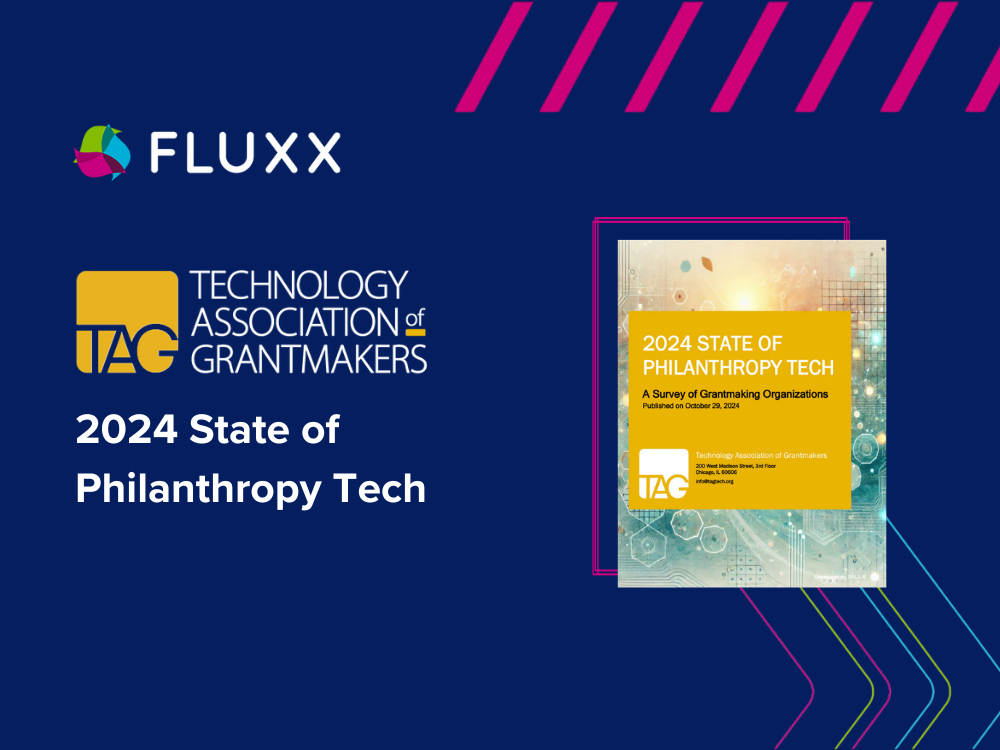3 Key Takeaways from TAG’s State of Philanthropy Tech Report 2022 (Updated for 2024)
TAG’s State of Philanthropy Tech report lists Fluxx as the number one grants management system for private foundations. Uncover the report’s 3 key...
Be the first to know about new Fluxx grants management resources, blog articles and podcasts.

The Technology Association of Grantmakers (TAG) has just released its State of Philanthropy Tech Report 2024, and it’s packed with insights on the intersection of technology and philanthropy. This biannual report, with input from 355 foundations across North America, Europe, and the U.K., covers everything from artificial intelligence (AI) to cybersecurity, Diversity, Equity, and Inclusion (DEI), emerging tech tools and much more. I’d like to highlight five key trends you don’t want to miss in TAG’s State of Philanthropy Tech report. Let’s get to it!
Fluxx has once again claimed the #1 spot among 17 grants management systems, continuing our track record as the top choice in the TAG survey since its inception in 2020. Across all organizations including foundations, public charities, corporate giving, and government surveyed, 20% of respondents selected Fluxx as their preferred system.
Fluxx holds the lead spot across private foundations, with 34% of independent foundations and 26% of family foundations selecting Fluxx as their preferred system. Across all organizations surveyed that picked Fluxx, they praised our user-friendly design and forward-thinking features that make grant management smoother and more effective.
Notably, the use of homegrown systems continues to drop, with only 3% of foundations opting to build a solution in-house.
With so many options out there, it’s essential for grantmakers to pick a solution that is purpose-built with their goals in mind. Fluxx’s high ranking speaks to our reputation and ongoing commitment to philanthropic giving.
AI tools are becoming essential in philanthropy—81% of surveyed foundations say they’re now using some form of AI, spurred by tools like ChatGPT. Yet only 30% have formal AI policies in place, pointing to a big gap in governance.
As the philanthropic sector explores AI tools, establishing clear policies will be critical to ensuring ethical and effective use, particularly when handling sensitive data or making automated decisions that impact nonprofit funding.
This year, Fluxx took a big step forward by releasing its first AI feature, which generates concise application summaries right within our platform. This tool is designed to save time for grantmakers by providing quick insights while preserving the integrity of each application. And we're committed to making sure all our AI tools prioritize ethical and safe usage, setting the standard for responsible AI in the sector.
Diversity, Equity, and Inclusion (DEI) is more than a buzzword—it’s a priority in philanthropy for 2024. According to TAG, 31% of foundations have ramped up their DEI initiatives over the past two years, investing in programs and training to foster inclusion. This year’s report also highlights a positive shift in tech teams, with 19% of foundations making efforts to boost representation in IT.
While 31% of foundations reported no change in their DEI programs, only 5% reduced their DEI efforts. With sectors like technology playing a vital role in the future of philanthropy, maintaining and expanding DEI initiatives will be key.
Cybersecurity remains a hot topic for foundations, and there’s good news—fewer organizations reported breaches this year. Only 11% of foundations experienced a breach in the past two years, down slightly from 12% in 2022. Community foundations saw the lowest breach rates at 5%, while family foundations reported the highest at 13%.
Cybersecurity insurance is now commonplace, with 73% of community foundations carrying coverage. As foundations increasingly rely on digital platforms to manage sensitive information, this continued emphasis on security is essential.
Community foundations are showing impressive strides in technology adoption, particularly in the areas of AI and hybrid work models. A standout finding from the report is that 33% of community foundations have implemented AI policies, the highest of any grantmaking type. Additionally, 78% are already using AI tools, with many staff members experimenting with different applications to improve their operations.
On the workplace front, community foundations are increasingly embracing hybrid models, with 82% of organizations adopting a mix of remote and in-person work. These changes reflect broader shifts in the workplace and the ongoing evolution of how grantmaking organizations operate in a post-pandemic world.
Community foundations are also notable for their commitment to providing tech support and training for nonprofit grantees, with 44% offering technical assistance—more than any other type of foundation. This approach not only empowers grantees but also strengthens the overall ecosystem of philanthropy.
The State of Philanthropy Tech Report 2024 from TAG highlights the rapid pace of change in the philanthropic sector, driven by technology. Whether it’s AI, cybersecurity, or DEI, these trends are reshaping how foundations make a difference. As Fluxx continues to lead in grants management and pioneers responsible AI features, we’re committed to helping grantmakers work smarter and more efficiently.
For foundations looking to stay ahead of the curve, the full report is a treasure trove of insights and benchmarks. .
Read the full TAG State of Philanthropy Tech Report 2024 to explore these trends and more.
TAG’s State of Philanthropy Tech report lists Fluxx as the number one grants management system for private foundations. Uncover the report’s 3 key...
Tata Trusts Medical Grants offer financial aid for medical treatments. Learn how to apply, eligibility criteria, and how Fluxx simplifies the grant...
We recently sat down with Forefront (a Fluxx client and partner) and the TAG community to share 6 Tested Ways to Build Capacity for your Grantees in...
Be the first to know about new Fluxx grants management resources, blog articles and podcasts.